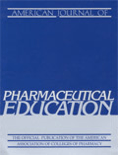
AMERICAN JOURNAL OF PHARMACEUTICAL EDUCATION
Scope & Guideline
Elevating Standards in Pharmacy Education and Research
Introduction
Aims and Scopes
- Curriculum Development and Evaluation:
AJPE emphasizes research on the design, implementation, and assessment of pharmacy curricula, focusing on evidence-based practices that enhance student learning outcomes and prepare graduates for contemporary pharmacy practice. - Innovative Teaching Strategies:
The journal publishes studies on novel pedagogical approaches, including active learning, interprofessional education, and the integration of technology in teaching, aimed at fostering student engagement and competency. - Diversity, Equity, and Inclusion:
A core area of focus is the promotion of diversity, equity, and inclusion within pharmacy education, addressing systemic barriers and exploring strategies to enhance representation and support for underrepresented groups. - Professional Identity Formation and Competency Development:
AJPE highlights research on professional identity formation among pharmacy students, examining how educational experiences shape their roles as future healthcare providers and contribute to their professional competencies. - Assessment and Evaluation Practices:
The journal addresses various assessment strategies, including formative and summative evaluations, that are crucial for measuring student performance and ensuring educational quality in pharmacy programs. - Impact of Social Determinants of Health:
Research exploring the influence of social determinants on health and healthcare access is featured, emphasizing the role of pharmacy education in preparing students to address health disparities.
Trending and Emerging
- Interprofessional Education (IPE):
A growing body of research focuses on interprofessional education, emphasizing collaborative practice among healthcare disciplines to improve patient outcomes and foster teamwork among future healthcare providers. - Mental Health and Well-Being:
There is an increasing emphasis on mental health and well-being in pharmacy education, with studies exploring the impact of stress, burnout, and resilience on pharmacy students and faculty, as well as strategies to support mental health. - Technology-Enhanced Learning:
Research on the integration of technology in pharmacy education, including the use of virtual simulations, online learning platforms, and AI tools, is gaining traction as educators seek innovative ways to engage students. - Diversity and Inclusion Initiatives:
There is a heightened focus on diversity and inclusion initiatives within pharmacy education, with research aimed at understanding and improving the representation of underrepresented groups in pharmacy programs. - Competency-Based Education (CBE):
The trend towards competency-based education is growing, with research investigating the development and assessment of competencies that align with the needs of the pharmacy profession and the healthcare system. - Social Justice and Health Equity:
Emerging themes related to social justice and health equity are becoming more prominent, reflecting a commitment to address systemic inequities in healthcare and the role of pharmacists in advocating for health equity.
Declining or Waning
- Traditional Lecture-Based Teaching Methods:
There is a noticeable decline in research focused on traditional, lecture-based teaching methods, as the emphasis shifts towards more interactive and student-centered learning approaches. - Generic Curriculum Structures:
Research centered around generic curriculum frameworks is becoming less common, with a move towards more tailored and competency-based curricula that address specific educational goals and student needs. - Standardized Testing as a Sole Assessment Method:
The reliance on standardized testing as the primary assessment tool is waning, as educational research increasingly advocates for diverse and holistic evaluation methods that better reflect student competencies. - Focus on Basic Science Content:
Papers solely emphasizing basic science content in isolation from clinical practice are decreasing, reflecting a trend towards integrated approaches that connect scientific knowledge with practical application in patient care. - Single-Institution Studies:
Research limited to single institutions is less frequent, as the journal encourages collaborative, multi-institutional studies that provide broader insights and enhance the generalizability of findings.
Similar Journals

Journal of Science Education and Technology
Integrating Innovation in Science Education.The Journal of Science Education and Technology, published by SPRINGER, stands as a premier platform in the fields of education and engineering, recognized with a prestigious Q1 ranking in both categories as of 2023. With an ISSN of 1059-0145 and an E-ISSN of 1573-1839, this journal serves as a pivotal resource for researchers, educators, and practitioners alike, emphasizing the integration of scientific inquiry and technological advancements in educational contexts. Since its inception in 1992, the journal has consistently provided high-quality, peer-reviewed research that shapes contemporary practices and methodologies in science education. With its notable Scopus rankings, including a 95th percentile in Social Sciences Education, the journal is essential for anyone eager to enhance their understanding of effective teaching in STEM fields. While the journal is not open access, its contributions are invaluable to advancing knowledge and innovations that are crucial for the progressive education landscape, making it a must-read for scholars and students committed to excellence in science education.
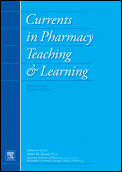
Currents in Pharmacy Teaching and Learning
Advancing pharmacy education through innovative insights.Currents in Pharmacy Teaching and Learning, published by Elsevier Science Inc, is a leading academic journal dedicated to advancing the education and practice of pharmacy. With the ISSN 1877-1297 and E-ISSN 1877-1300, this journal serves as a vital resource for researchers, educators, and students in the field of pharmacology and pharmacy. As of 2023, it proudly boasts a Q2 quartile ranking in both Pharmacology, Toxicology, and Pharmaceutics and Pharmacy, underscoring its influential role in disseminating high-quality research. Over its converged years from 2009 to 2024, Currents in Pharmacy Teaching and Learning has provided an invaluable platform for scholarly discourse, focusing on innovative teaching methodologies and learning experiences that enhance pharmacological education. Although it operates under a subscription model, this journal is highly regarded in the community, with Scopus rankings placing it in the upper tiers of its categories. Engaging with this journal allows readers to stay at the forefront of educational advancements in pharmacy, making it indispensable for continual professional development and academic inquiry.
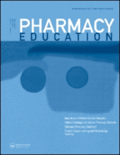
PHARMACY EDUCATION
Enhancing curricula for a dynamic pharmacy profession.PHARMACY EDUCATION, an esteemed journal published by the INTERNATIONAL PHARMACEUTICAL FEDERATION, is dedicated to advancing the field of pharmacy education through high-quality research, reviews, and innovative practices. With an ISSN of 1560-2214 and an E-ISSN of 1477-2701, this journal provides a vital platform for educators, researchers, and professionals to discuss contemporary issues and opportunities within pharmaceutical education. Recognized for its relevance, it holds a Q4 ranking in Education and Q3 in both Pharmaceutical Science and Pharmacy as of 2023. Despite its Scopus rankings reflecting a growing niche, with positions such as 30/45 for Pharmacy in Health Professions, it showcases a commitment to nurturing the next generation of pharmacy practitioners. As a crucial resource for enhancing pharmacy curricula and pedagogical strategies, PHARMACY EDUCATION invites contributions from those dedicated to enriching educational methodologies and promoting excellence in pharmaceutical training. This journal plays an essential role in bridging academic research and practical application, encouraging the ongoing evolution in pharmacy education across the globe.
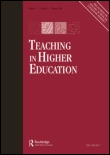
TEACHING IN HIGHER EDUCATION
Fostering inclusive discourse on educational methodologies.TEACHING IN HIGHER EDUCATION is a premier academic journal published by Routledge Journals, Taylor & Francis Ltd, dedicated to advancing the scholarship and practice of teaching within the higher education sector. With an ISSN of 1356-2517 and an E-ISSN of 1470-1294, this journal is widely recognized for its profound impact in the field, boasting a 2023 category rank of Q1 in Education, placing it in the top tier of educational research. Its commitment to fostering an inclusive and dynamic discourse on pedagogical methods and learning frameworks makes it essential reading for researchers, educators, and policymakers alike. Spanning topics such as student engagement, curriculum development, and innovative teaching strategies, TEACHING IN HIGHER EDUCATION aims to contribute to ongoing conversations and practical applications that enhance the educational landscape. While an Open Access option is not available, the journal maintains a robust readership, with its articles being rigorously peer-reviewed and disseminated to reflect cutting-edge research trends and practices in education.
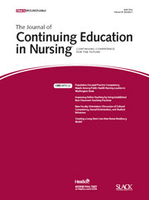
JOURNAL OF CONTINUING EDUCATION IN NURSING
Transforming Nursing Through Research and Education.JOURNAL OF CONTINUING EDUCATION IN NURSING, published by SLACK INC, is an esteemed journal dedicated to the field of nursing education and professional development. Since its inception in 1970, it has actively contributed to the growth of nursing knowledge and practice, making it an essential resource for educators, practitioners, and researchers alike. The journal holds a solid standing with an impact factor reflecting its importance, categorized as Q2 in Nursing (Miscellaneous) and Review and Exam Preparation, and Q3 in Education according to the 2023 rankings. With a mission to support ongoing education among nursing professionals, it provides a platform for innovative research, evidence-based practices, and comprehensive reviews that enhance nursing education. The journal is accessible in print and does not currently offer open access options, ensuring exclusivity in its high-caliber content. As it converges into 2024, the JOURNAL OF CONTINUING EDUCATION IN NURSING remains pivotal in shaping the future of nursing education and facilitating professional excellence.

Pharmacy
Advancing pharmaceutical knowledge for a healthier tomorrow.Pharmacy is a premier open-access journal published by MDPI, dedicated to advancing research in the dynamic field of pharmaceutical sciences. Since its inception in 2013, this journal has become a vital platform for disseminating novel findings, reviews, and insights related to drug development, pharmacokinetics, pharmaceutical technology, and clinical applications. With an E-ISSN of 2226-4787, Pharmacy prioritizes accessibility and visibility, allowing researchers, professionals, and students from around the globe to engage with cutting-edge research without barriers. The journal plays a crucial role in shaping pharmaceutical education and practice, fostering innovative ideas and collaborative approaches aimed at improving health outcomes. As part of the MDPI family, Pharmacy is committed to maintaining high-quality standards, ensuring that all published articles undergo rigorous peer review.
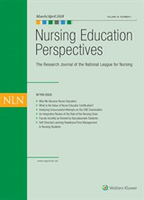
Nursing Education Perspectives
Transforming Perspectives in Nursing EducationNursing Education Perspectives is an esteemed peer-reviewed journal published by LIPPINCOTT WILLIAMS & WILKINS, focusing on the vital intersection of education and nursing practice. With an ISSN of 1536-5026 and an E-ISSN of 1943-4685, this journal has been serving the nursing education community since its inception in 2002 and will continue to do so until 2024. In 2023, it achieved a commendable Q2 ranking in Nursing and Q3 in both Education and Miscellaneous Medicine, reflecting its significant contribution to the academic landscape. Although it follows a traditional access model, the journal consistently aims to provide high-quality research, innovative pedagogical strategies, and best practices that can enhance nursing education globally. Given its position within the 49th percentile for General Nursing and Social Sciences, Nursing Education Perspectives is an essential resource for researchers, educators, and practitioners dedicated to advancing nursing training and education.

GMS Journal for Medical Education
Transforming Medical Training Through InnovationGMS Journal for Medical Education, published by GERMAN MEDICAL SCIENCE-GMS, stands as a pivotal platform for innovative research and discourse in the realm of medical education. With an ISSN of 2366-5017, this Open Access journal has been serving the global academic community since 2016, ensuring that critical information remains accessible to all stakeholders in the field. Located in Germany, this journal is dedicated to advancing knowledge and best practices in educational methodologies, policies, and research, garnering a commendable Q2 rank in Education and a Q3 in Medicine for 2023. As a reputable source in Scopus, where it ranks #462 out of 1543 in Social Sciences - Education, the GMS Journal for Medical Education invites researchers, educators, and students alike to contribute to its mission of enhancing medical training and fostering educational excellence, particularly as it approaches its converged years from 2016 to 2024. This journal not only serves as a rich resource for academic advancement but also stimulates essential conversations that shape the future of medical education worldwide.
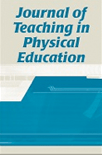
JOURNAL OF TEACHING IN PHYSICAL EDUCATION
Empowering Educators, Inspiring Students.JOURNAL OF TEACHING IN PHYSICAL EDUCATION, published by Human Kinetics Publishers Inc, stands as a premier academic journal committed to advancing knowledge and practice in the realms of physical education and related fields. With an impressive impact factor reflecting its relevance and influence in educational research, this journal boasts a distinguished classification as a Q1 journal in Education and Physical Therapy fields for 2023. Spanning from 1996 to 2024, it offers insightful contributions that engage educators, researchers, and students alike, addressing the evolving landscape of teaching methodologies and their implications for student health and fitness. The journal is accessible via traditional subscription models, providing a platform for innovative studies that aim to enhance teaching effectiveness and athletic performance. With a firm focus on interdisciplinary approaches, it plays a pivotal role in shaping future curricula in physical education and sports medicine.

JOURNAL OF FURTHER AND HIGHER EDUCATION
Exploring New Frontiers in Higher LearningJournal of Further and Higher Education, published by Routledge Journals, Taylor & Francis Ltd, stands as a prominent platform in the field of education, with a distinguished focus on further and higher education studies. With an ISSN of 0309-877X and E-ISSN of 1469-9486, this journal has been contributing invaluable insights since its inception in 1977. The journal boasts a remarkable Q1 ranking in its category for 2023, placing it in the top tier of educational research, underscored by its 83rd percentile ranking among Scopus Ranks in Social Sciences - Education. Researchers and practitioners alike are encouraged to submit their work, as the journal aims to foster innovative discussions and disseminate high-quality scholarly articles that address contemporary challenges in further and higher education. With its commitment to academic excellence, Journal of Further and Higher Education plays a crucial role in shaping policy and practice in the educational landscape, ensuring that the voices of educators and learners are heard and valued.